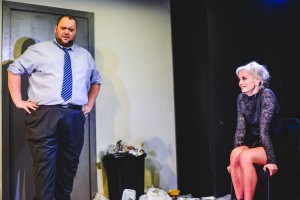Wow. Simply wow. A mindblowing piece of theatre that was both moving and thought-provoking, achieving exactly what a play should.
When an older man and a young girl meet, we are unsure of the relationship and the motive for the meeting. The beginning is a little slow-paced, but serves all the more to intensify the impact when the audience understands that the abused comes face to face with her abuser after twenty years. Emotions run high as Una details how child abuse has affected her life in various ways.
David Harrower’s play is tightly woven and moves seamlessly through periods of nervousness, rage, despair, awkwardness, dominance and confrontation. We are compelled to understand Ray’s motives (played by award-winning actor Christian Patterson) and even believe that he has changed as he tries to reason and justify his behaviour. I found it utterly shocking how abusers can be so deceptive and misleading. In a society that is geared to protect childhood and innocence, it is a chilling fact that judges in such cases of abuse have been known to refer to a child’s ‘adult yearnings’. We also become to understand how this experience has affected Una’s intimate relationships during her life, and the hold the abuser has had on her outlook. The most potent force of all was the presence of self-denial in both characters.
Throughout the play, directed by Ruper Hands, we are cleverly led to be torn and tortured between suspicion, suspense and doubt before we are thrown into turmoil with a brutal reality at the end. Even as the play unfolds, we are plagued with tormenting questions that means we are not completely convinced whether an abuser can truly change or not. This ambiguity was the core of the production for me.
The actors were convincing throughout the performance, and created an electrifying atmosphere at times. I remember Sophie Melville from her exceptional portrayal in ‘Iphigenia in Splott’, and was not disappointed once again. She has a prosperous acting career ahead of her. The relationship between both characters alters our sympathy relentlessly, and the evolving dynamics inspires us to consider both standpoints. The characterization was interpreted in a sophisticated and mature manner. Such a sinister theme could have evoked a tendency to exaggerate, but an understated and subtle expression of such a strong story was all the more powerful.
A very dark topic was explored sensitively and harrowingly. It was understandably uncomfortable to watch at times, but these scenes were pitched perfectly to unease the audience. The dialogue is one of the best I have experienced, especially the girl’s monologue. Crude and explicit language could be offensive to some, but in my opinion it serves its purpose and enhances the poignancy of the situation. The director should be commended as dealing with such a taboo subject would not have been an easy task. Several gripping scenes actually made the hair on my arms stand on end.
I particularly liked the symbol of the door, and how it incurred mood changes as it opened and closed. The small set created a feeling of entrapment, which made the actors’ movement all the more intricate, and epitomized the close connection – even bond – between both. Their physicality was memorable. I also liked the contrast between light and darkness. Sound effects could possibly have been extended, for instance the blackbird in order to reinforce the significance of the play’s title. Then again, such a strong dialogue required no additional supplements.
Conveying an incredibly complex issue delicately requires skill and competency on every level. With topics of this sort, there is no definitive answer, and I left the theatre feeling unfulfilled in the sense that obscurity haunted me. It has been said that the thought process and pondering following a production is a hallmark of a successful play, and I attest to this. A must-see at Porters for another week, and another hit by The Other Room.
http://www.otherroomtheatre.com/en/whats-on/seasons/autumnwinter-at-the-other-room/blackbird/


